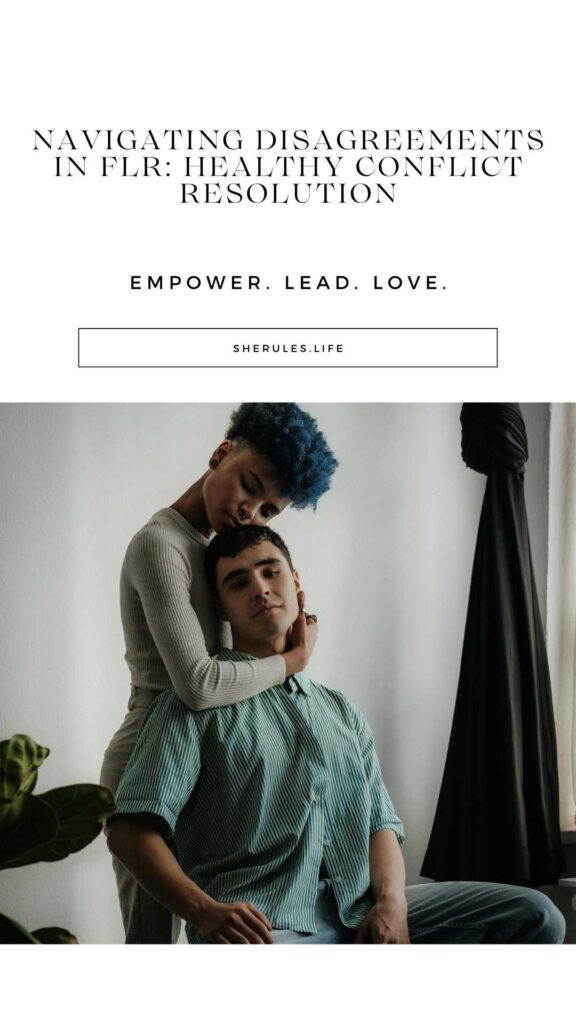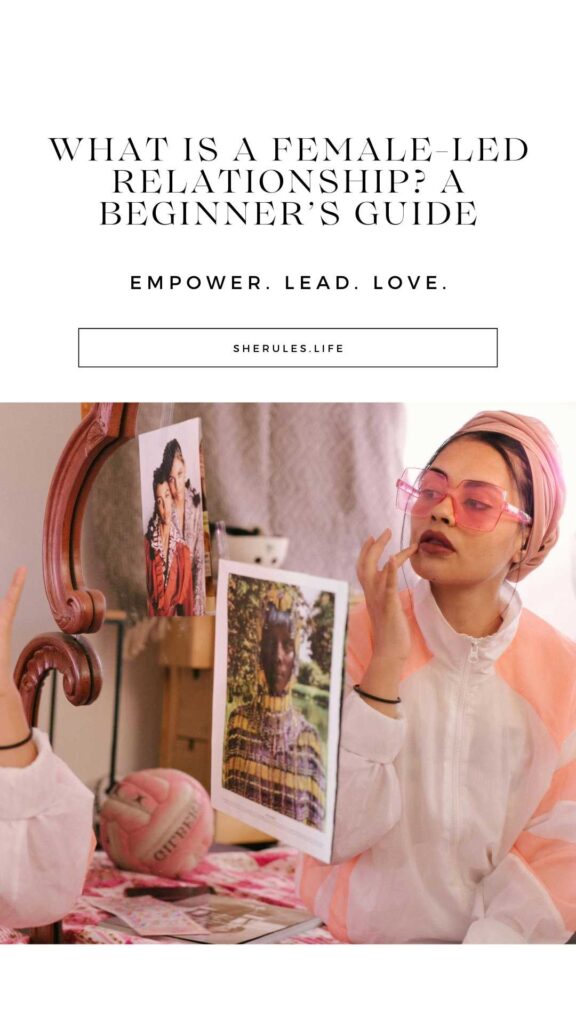
As we all know, no relationship is without its challenges, but in an FLR, it’s crucial to approach these bumps in the road with care, respect, and a commitment to growth.
Let’s face it – disagreements are a natural part of any relationship. They’re not inherently bad; in fact, they can be opportunities for deeper understanding and connection when handled well.
In an FLR, where traditional relationship dynamics are flipped on their head, it’s even more important to have solid conflict resolution skills. So, let’s explore how we can navigate these tricky waters together!
Understanding the Unique Dynamics of FLR Conflicts
Before we dive into specific strategies, it’s important to recognize that conflicts in an FLR might look a bit different from those in traditional relationships. The power dynamic is shifted, and this can influence how disagreements arise and how they’re resolved.
In an FLR, the female partner takes on a leadership role. This means she often has the final say in decisions, but it also means she bears more responsibility for the relationship’s overall health and direction.
For the male partner, it can sometimes be challenging to voice concerns or disagreements while still respecting the established power dynamic.
This unique setup requires a delicate balance of assertiveness, respect, and open communication from both partners.
It’s not about one person always being right or getting their way, but about finding solutions that honor the relationship’s structure while meeting both partners’ needs.
The Foundation- Effective Communication
At the heart of healthy conflict resolution lies effective communication. This is true for all relationships, but it takes on extra importance in an FLR. Effective communication strategies for FLR couples are the bedrock upon which we build our conflict resolution skills.
One of the most crucial aspects of communication in an FLR is active listening. Active listening: the key to understanding in FLR isn’t just about hearing words – it’s about truly understanding your partner’s perspective.
This means giving your full attention, avoiding interruptions, and reflecting back what you’ve heard to ensure you’ve understood correctly.
For example, if your partner says, “I feel like my opinions aren’t valued in our decision-making process,” don’t jump to defend yourself.
Instead, try repeating back what you heard: “It sounds like you’re feeling undervalued when we make decisions together. Can you tell me more about that?”
This approach allows your partner to feel heard and understood, which is the first step in resolving any conflict.
Expressing Needs and Desires
Another crucial aspect of healthy conflict resolution is the ability to express your own needs and desires clearly and respectfully. In an FLR, this can sometimes be challenging, especially for the male partner who might worry about overstepping boundaries.
However, expressing needs and desires in a female-led relationship is not only okay – it’s essential for the health of the relationship. Both partners should feel comfortable voicing their thoughts, feelings, and concerns.
For the female partner, it’s important to create an environment where your partner feels safe expressing themselves. This might mean actively encouraging them to share their thoughts, even if they differ from your own.
For the male partner, it’s about finding the balance between respecting the FLR dynamic and honestly communicating your needs. Remember, expressing a need or desire isn’t the same as demanding it be met – it’s opening a dialogue.
Regular Check-ins- Prevention is Better Than Cure
One of the best ways to handle conflicts in an FLR is to prevent them from escalating in the first place. This is where regular check-ins come in handy. The importance of regular check-ins in FLR cannot be overstated.
These check-ins provide a dedicated time and space to discuss any issues before they become major problems. They also help maintain open lines of communication and can strengthen your bond as a couple.
During these check-ins, you might discuss:
- How you both feel the relationship is going
- Any concerns or issues that have come up recently
- Celebrations of what’s working well
- Goals for the future
Remember, these check-ins aren’t just for discussing problems – they’re also a chance to appreciate the positive aspects of your relationship and to realign on your shared vision for the future.
The Power of Non-Verbal Communication
While words are important, we often forget about the power of non-verbal communication. In fact, non-verbal communication in female-led relationships can sometimes speak louder than words.
During conflicts, pay attention to your body language and tone of voice. Are you crossing your arms, signaling defensiveness? Is your tone sharp or dismissive? These non-verbal cues can escalate a conflict even when your words are conciliatory.
Instead, try to maintain open body language, make eye contact, and speak in a calm, measured tone. These non-verbal signals can help create an atmosphere of understanding and cooperation, even in the midst of a disagreement.
Setting and Respecting Boundaries
In any relationship, but especially in an FLR, it’s crucial to have clear boundaries. Setting and respecting boundaries in FLR is a key part of preventing and resolving conflicts.
Boundaries aren’t about limiting your partner or your relationship – they’re about creating a safe, respectful space for both of you to thrive. They clarify expectations and help prevent misunderstandings that can lead to conflicts.
When setting boundaries, be clear and specific. Instead of saying, “I need more space,” try, “I’d like to have one evening a week to pursue my own interests.”
Remember, boundaries go both ways. The female partner should respect the male partner’s boundaries just as much as her own are respected. This mutual respect forms the foundation of a healthy FLR.
The Art of Giving and Receiving Feedback
In an FLR, as in any relationship, giving and receiving feedback is an important skill. How to give and receive feedback in a female-led relationship is something that takes practice, but it’s well worth the effort.
When giving feedback, try to be specific and focus on behaviors rather than character traits. For example, instead of saying, “You’re always so messy,” try, “I feel frustrated when I come home to dirty dishes in the sink.”
When receiving feedback, resist the urge to become defensive. Instead, listen actively, ask for clarification if needed, and thank your partner for their honesty. Remember, feedback is an opportunity for growth, not an attack.
Building Emotional Intelligence
Emotional intelligence plays a huge role in how we handle conflicts. Building emotional intelligence for better FLR communication can significantly improve your ability to navigate disagreements.
Emotional intelligence involves recognizing and managing your own emotions, as well as being able to recognize and respond appropriately to your partner’s emotions.
This skill can help you stay calm during heated moments and respond with empathy rather than anger.
To build emotional intelligence, try practices like mindfulness meditation, journaling about your emotions, or simply taking a moment to check in with yourself about how you’re feeling throughout the day.
The Role of Honesty and Transparency
At the core of healthy conflict resolution is a commitment to honesty and transparency. The role of honesty and transparency in FLR communication cannot be overstated.
Being honest doesn’t mean being brutal or unkind. It means being truthful about your feelings, needs, and concerns in a respectful way. Transparency means being open about your thoughts and actions, even when it’s uncomfortable.
In an FLR, where trust and power exchange are so important, honesty and transparency become even more crucial. They help build and maintain the trust necessary for the relationship to thrive.
Practical Steps for Resolving Conflicts in an FLR
Now that we’ve covered the foundations, let’s look at some practical steps you can take when a conflict arises in your FLR:
- Take a breather: If emotions are running high, take a short break to calm down. Agree on a time to come back and discuss the issue when you’re both feeling more level-headed.
- Use “I” statements: Instead of accusatory “you” statements, use “I” statements to express how you feel. For example, “I feel hurt when…” instead of “You always…”
- Focus on the issue, not the person: Remember, it’s you and your partner versus the problem, not you versus your partner.
- Brainstorm solutions together: Even in an FLR where the female partner has the final say, it’s important to involve both partners in finding solutions.
- Be willing to compromise: While the FLR dynamic might mean the female partner has more decision-making power, being willing to find middle ground can strengthen your relationship.
- Follow up: After you’ve reached a resolution, check in later to see how it’s working and if any adjustments are needed.
Handling Recurring Conflicts
Sometimes, you might find yourselves facing the same conflicts over and over. This can be frustrating, but it’s not uncommon. Here are some strategies for dealing with recurring conflicts:
- Look for underlying issues: Often, recurring conflicts are symptoms of deeper issues. Try to identify what’s really at the root of the problem.
- Revisit your agreements: If you’re consistently butting heads over the same issues, it might be time to revisit and possibly renegotiate some of your FLR agreements.
- Seek outside help: Sometimes, an objective third party like a relationship counselor can provide valuable insights and strategies.
- Practice patience: Change takes time. Be patient with yourself and your partner as you work on improving your conflict resolution skills.
When Conflicts Arise from FLR Dynamics
Sometimes, conflicts in an FLR can arise from the power dynamic itself.
Perhaps the submissive partner is struggling with a decision the dominant partner has made, or the dominant partner is feeling overwhelmed by the responsibility of leadership.
In these cases, it’s crucial to have open, honest discussions about your FLR dynamic. Are both partners still happy with the current arrangement? Are there areas where you need to adjust your expectations or agreements?
Remember, an FLR, like any relationship, should be fulfilling for both partners. If the dynamic is causing persistent conflicts, it’s okay to reevaluate and make changes.
Growing Through Conflict
While conflicts can be challenging, they also present opportunities for growth – both individually and as a couple.
Each successfully resolved disagreement can strengthen your communication skills, deepen your understanding of each other, and reinforce your commitment to the relationship.
After resolving a conflict, take some time to reflect. What did you learn about yourself? About your partner? How can you apply these insights to strengthen your relationship moving forward?
Celebrating Resolution and Connection
Finally, don’t forget to celebrate when you successfully navigate a conflict together. This doesn’t have to be anything big – maybe a special meal together or simply taking a moment to express your appreciation for each other’s efforts.
Acknowledging these successes reinforces positive conflict resolution behaviors and reminds you both that you’re on the same team, working together to build a strong, healthy FLR.
Conclusion
Navigating disagreements in an FLR requires patience, practice, and a commitment to open, honest communication.
Focusing on active listening, expressing needs clearly, setting healthy boundaries, and approaching conflicts with empathy and respect, you can turn potential sources of discord into opportunities for growth and deeper connection.
Remember, the goal isn’t to avoid conflicts altogether – that’s neither possible nor desirable.
Instead, aim to handle disagreements in a way that honors your FLR dynamic while ensuring both partners feel heard, respected, and valued.
Every relationship faces challenges, but with the right tools and mindset, you can navigate these rough patches and emerge stronger on the other side.
Keep practicing these skills, be patient with yourself and your partner, and don’t be afraid to seek help if you need it.
Here’s to building stronger, more resilient FLRs through healthy conflict resolution!
If you found this article helpful, please consider supporting my work. Your support helps me continue creating valuable content for the FLR community. You can buy me a coffee here. Every contribution, no matter how small, means the world to me and keeps me motivated to keep writing. Thank you for your support!

